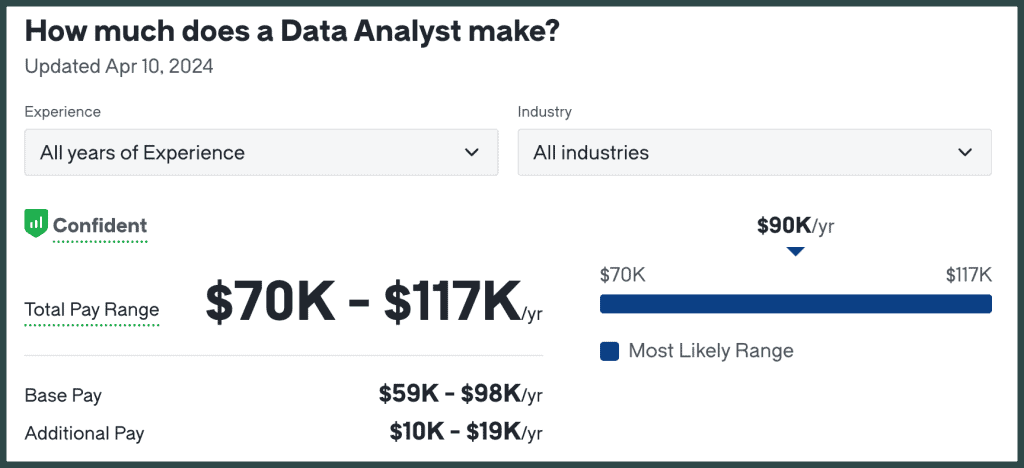Is Data Analysis a High-Income Skill?

Data analysis is a skill that has become increasingly valuable in today’s job market.
With the rise of big data, companies are looking for professionals who can effectively analyze data and provide insights to help them make informed decisions.
But is data analysis a high-income skill? The answer is yes, and I will explore why in this article.
Contrary to popular belief, data analysis is not just for data analysts. Basic data analysis skills can be valuable across industries and used productively across various job functions.
What is Data Analysis Really About?
Data analysis collects, cleans, transforms, and models data to extract useful information, draw conclusions, and support decision-making. It involves using various techniques and methodologies to interpret data from different sources in various formats, both structured and unstructured.
To become a skilled data analyst, you need a strong foundation in statistics and proficiency in tools such as Excel, SQL, R, and Python.

You should also be able to manipulate data, create visualizations, and communicate insights effectively.
As a data analyst, your primary responsibility is to help organizations make data-driven decisions.
You will work with stakeholders to identify business problems and opportunities and then use data to develop insights and recommendations. You will also be responsible for cleaning and preparing data, performing statistical analyses, and creating visualizations and reports.
Data analytics is a growing field, and there is a high demand for skilled data analysts across various industries. As a result, data analysis is a high-income skill that can lead to lucrative career opportunities.
Is Data Analysis a High-Income Skill?
Data analysis is a high-income skill due to its critical role in helping businesses make data-driven decisions, which can lead to more effective strategies and improved financial performance.
In today’s data-rich environment, companies across various sectors—such as finance, healthcare, marketing, and technology—seek professionals who can collect, organize, and interpret data to identify trends, solve problems, and predict future outcomes.
According to GlassDoor, a data analyst in the United States can expect to make an average total pay of $90,000 per year. This figure includes an average base salary of $76k+ per year and additional compensation such as cash bonuses, commissions, tips, and profit sharing, averaging $13k+ annually.

The demand for data analysts is reflected in the job market, where the need for these skills has consistently grown.
According to reports by the U.S. Bureau of Labor Statistics and other labor market research, the job outlook for data analysts is projected to grow much faster than the average for all occupations, indicating strong demand and potentially high salaries for qualified professionals.
Data analysis encompasses a range of techniques and tools, including statistical analysis, data mining, and predictive modeling.
Proficiency in programming languages such as Python or R, experience with database query languages like SQL, and the ability to use data visualization tools are often required.
Given data analysis’s value to an organization and the specialized skill set required, individuals with expertise in this area can command high salaries.
The exact income level can vary based on geographic location, industry, level of experience, and education. However, the overall trend indicates that data analysis is a lucrative career path with the potential for strong financial rewards.
Can Data Analysis Make You Rich?
If you have a strong background in data analysis, you can be more intentional with the data you receive, how you interpret it, and how you share it.
Here are three examples of how data analysis skills may show up in your career, job search, or even personal life:
- Data analysis for highlighting accomplishments on your resume:
Highlighting your data analysis skills can help you stand out if you want to impress potential employers.
By demonstrating that you have experience working with large data sets and can draw meaningful insights from them, you can show that you have the expertise needed to help companies make better decisions.
- Data analysis for identifying trends and patterns:
In many industries, identifying trends and patterns in data is crucial for success. For example, understanding consumer behavior and preferences in marketing can help companies create more effective campaigns. In finance, identifying trends in the stock market can help investors make better decisions about where to put their money.
- Data analysis for improving business operations:
By analyzing data about a company’s operations, you can identify areas for improvement. For example, if a company is experiencing high turnover rates, analyzing employee data can help identify the root causes and suggest ways to improve retention.
How Does Data Analysts Make Money?
The salary of a data analyst can vary depending on several factors, such as experience, location, and industry.
Based on my research, the average salary for a data analyst is around $64,000 per year, with an entry-level data analyst earning around $36,000 per year or more. However, the more senior workers can earn higher salaries than many other professions, with the highest-paying jobs reaching $100,000 per year or more.
Moving into a leadership role can further boost your earning potential. As per Glassdoor, analytics managers earn an average salary of $129,076 in the US, while analytics directors earn $180,392.
It is worth noting that a data analyst’s salary can vary depending on the industry in which they work. For instance, a data analyst in the finance industry can expect to earn a higher salary than one in the retail industry.
In addition to a good salary, data analysts can earn money through bonuses and other incentives.
Many companies offer bonuses to their employees based on their performance, and data analysts are no exception. In fact, data analysts who deliver actionable insights that drive business growth are often rewarded with bonuses and other incentives.
Where Can I Find High-paying Data Analyst Jobs?
As a data analyst, you can find high-paying job opportunities in various industries such as healthcare, finance, technology, and retail.
Some top companies offering high-paying data analyst jobs include Google, Amazon, Microsoft, and IBM.
Here are some of the places where you can find high-paying data analyst jobs:
Job Boards
Job boards such as Indeed, Glassdoor, and LinkedIn are great places to start your job search. These websites have a vast database of job listings from various industries, locations, and salary ranges. You can filter your search by job title, location, industry, and salary range to find the most relevant job listings.
Company Websites
Many companies post their job openings on their websites. You can visit the careers section of the company’s website to find job listings for data analysts. You can also learn about the company’s culture, values, and mission, which can help you determine if the company is a good fit for you.
Recruitment Agencies
Recruitment agencies can help you find high-paying data analyst jobs that match your skills and experience. These agencies have connections with various companies and can help you find job opportunities not advertised on job boards or company websites.
Networking
Networking is essential to finding high-paying data analyst jobs. You can attend industry conferences, meetups, and events to connect with other data analysts and professionals in your field. You can also join online communities such as LinkedIn groups and forums to network with other professionals and learn about job opportunities.
Wrapping Up
In conclusion, data analysis is a high-income skill in high demand in various industries. With the exponential growth of data in recent years, companies are looking for professionals who can help them make sense of their data and use it to make informed decisions.
If you are interested in pursuing a career in data analysis, you must acquire various skills.
These skills include proficiency in programming languages such as SQL, Python, and R and knowledge of statistical analysis and data visualization tools.
You can take online courses, attend workshops, or work on real-world projects to build your data analysis skills. Additionally, you can join online communities and attend meetups to connect with other professionals in the field and learn from their experiences.
Disclosure: We may earn commissions if you buy via links on our website. Commissions don’t affect our opinions or evaluations. We’re also an independent affiliate of many platforms, including ClickFunnels, Kartra, GoHighLevel, Podia, Northwest Registered Agent, and others. We’re not employees of these services. We receive referral payments from them, and the opinions expressed here are our own and are not official statements of these companies.





